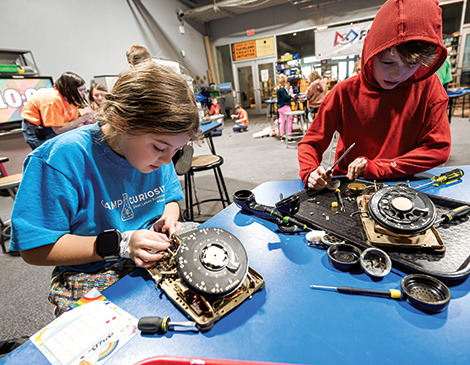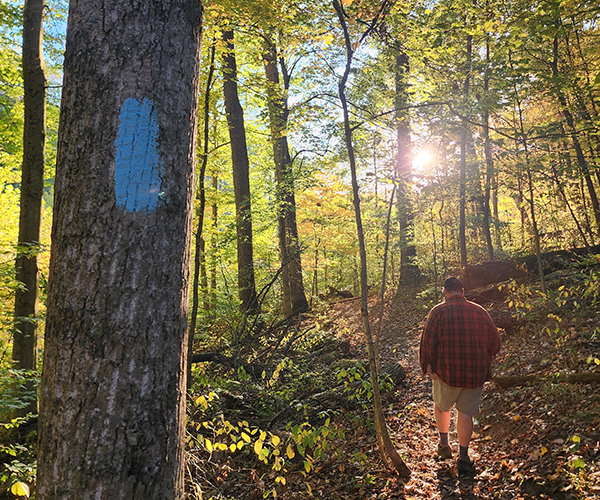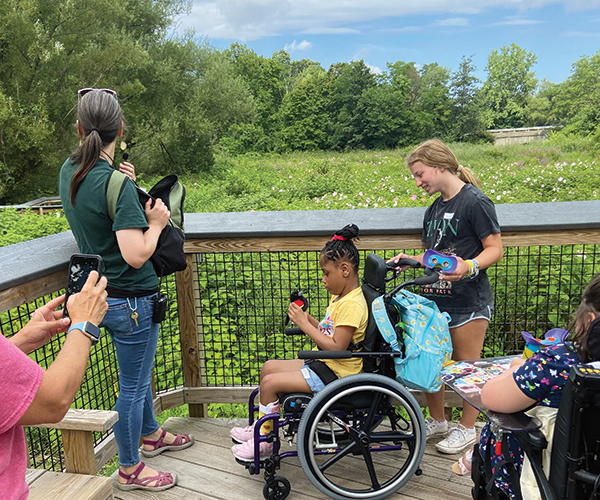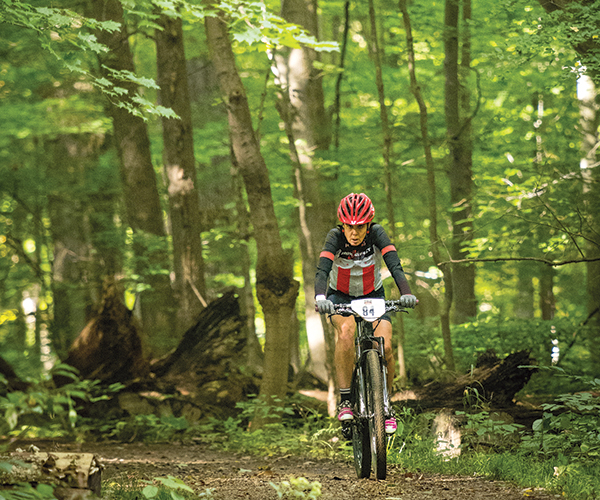Design sewing patterns and make something new to wear. Create stop-motion flip books and bring inanimate objects to life. Learn about Asian arts and culture by exploring the biology of pandas and traditional silk printing. Dig into science fiction, or make an escape room. Visit a trampoline park and find out, gravity works.
Pssst. That’s STEM, and in the summer, it doesn’t feel like schoolwork.
The warm-weather months off school are an ideal time to introduce a child to STEM concepts, “because we don’t call it STEM,” quips Rhonda Rickelman, Gilmour Academy’s director of auxiliary programming. “You can let kids try something they have an interest in or something you think they might like, and the camps are short.”
In some ways, camps “sneak in” STEM because kids are out of the typical classroom. There’s no test and no pressure. It’s just fun.
“Camps open the door for science, tech, engineering and art simply by presenting it in different ways,” adds Andrea DiSalvo, director of Summer at Laurel School. For instance, a sewing and cooking camp includes math, art and science, “but it is under the umbrella of exciting activities and kids don’t know they are actually learning those concepts. They see the opportunity as fun rather than learning.”
This can be especially important for kids who might begrudge math and think they’re just not good at science. “STEM summer camps allow information to be presented in a very different way that may enable a child to easily grasp the concept,” DiSalvo explains.
Sometimes, warming up to STEM is all about the delivery. And what better way to supersize STEM fun than to expose a hesitant child to science, engineering and math in disguise?
“It’s always a great time for STEM, but by going to a fun summer camp, kids are not getting graded like they typically are during the school year,” says Scott Vollmer, vice president of education and exhibits at Great Lakes Science Center. “At a summer camp, you have an opportunity to spread your wings and build confidence.”
That’s STEM?
A love for animals can be an inroad to STEM concepts. Magnificat High School offers its Little Vet School summer program for first through third graders. “They learn some anatomy through play activities, and it captures a natural interest and fascination in animals, introducing biology and medicine that can spark an interest,” says Teresa Messmore, director of communications at Magnificat, who assists with summer programming.
STEM doesn’t have to be about robots, drones or coding — though these are sought-
after programs that introduce students to exciting applications for their interests. And there are a plethora of programs throughout the region including CodeMonkey, Black Rocket and others.
What can intrigue kids who do not necessarily demonstrate an interest in STEM? Basically, it’s everywhere and all about asking questions (what kid doesn’t want to ask, “Why, why, why?”) and fostering curiosity.
Legos are STEM. When young children dabble at a water table or build a tower of blocks, that’s STEM. And these play-based activities are often slipped into general day camps.
“We offer a smattering of activities and enrichment — everything from putting celery in colored water to see what happens as we are learning about plants to team-building activities, like how can we put our arms together and untwist ourselves?” Rickelman says.
Camps at Magnificat can bridge language arts and STEM, such as its writing and pop culture exploration program, or a science fiction camp where kids watch a movie, talk about the ideas and explore them with a hands-on craft.
At Great Lakes Science Center, Camp Curiosity runs 11 weeks and covers a different subject in each session: chemistry, space, paleontology, sea life, sports, robots, Legos, Minecraft and so on. This gives kids a chance to try something new. “There are experiences and surprises, and you see when they get hands-on with mixing solutions, it opens up a world of STEM and makes it accessible,” Vollmer says.

STEM at Every Age
The cool thing about STEM is that it welcomes every age group and all types of learning styles because it’s highly experiential, creative, collaborative and inclusive. Everyone on a team contributes. There’s no one right way to solve a problem.
By spanning STEM across subjects and involving different ways to explore and engage in topics, “we find our girls having a better understanding of the world around them, more confidence in their own skills and a better understanding of themselves and their own interests,” DiSalvo says.
“It has to be age appropriate,” Rickelman adds. For instance, a Mouse Trap-inspired activity for 5- and 6-year-olds looks different than a similar-themed camp for
middle-schoolers that might involve building a trap kids can move through or creating a sort of escape room.
DiSalvo shares how STEM for younger campers ages 2 to 6 is interactive and presented in mini lessons. “That might include visits from Cleveland Museum of Natural History speakers [or] having toys available that are specifically for building and art that focuses on experimentation such as mixing paint colors with our hands or doing gravity art.”
For older students, camps might center on a specific topic like the All-Girls Robotics Camp or Urban Adventure/City Science camp.
And as campers grow up, their memorable STEM experiences can translate into career interests. “There is an age where girls can fall off in terms of interest in science and math, and we know that putting them in an all-girls environment will statistically nurture and grow their interest in STEM fields,” Messmore says, noting that about 40% of the Class of 2022 indicated they were pursuing a STEM field in college.
Beyond Summer
Resetting the idea that there is a right and wrong way to do things is one critical skill kids can discover through STEM learning. “Some kids lean toward perfectionism and that is not how life works,” Messmore says. “We learn by doing, we learn by making mistakes, we learn by not having something go the way we saw it, breaking it down and having the creativity, problem-
solving skills and perseverance to try again.”
During summer in a relaxed camp setting that is not staged in a classroom, students can be more open to accepting challenges and working together with kids they don’t see every day.
“Collaboration is key,” Vollmer emphasizes. “You introduce your child to different cultures, kids of different ages, and when you do that, there is obviously a positive social
impact. And overall, camps give kids opportunities to openly discuss what they think a solution to a problem is, to share that and listen to peers, and gain different perspectives and views from different communities. That is a critical life lesson.”
To be sure, camps that explore STEM are so much more than what the four-letter word implies.
“They are building leadership skills and participating in friendship-
building activities, health and wellness, too,” Messmore says. Magnificat also introduces campers to STEM careers by inviting in speakers from a range of fields.
“When we can make those connections for students and they learn about opportunities they might not have heard about, there can definitely be a lot of ‘aha’ moments,” Messmore continues. Some of the school’s STEM presenters have included a speech language pathologist, chief nursing officer, veterinarian and biomedical engineering professor.
Sometimes, a summer STEM experience can bring together kids with similar interests—and who knows where they might take it from there. DiSalvo shares how a group of girls from their robotics camp continued on to a middle school team, naming themselves The Science Sisters. They competed at the state Lego League Robotics Tournament. “The camp inspired a newfound interest that they then fostered well beyond the summer months,” she says.
Vollmer says the discovery and energy kids experience at STEM camps is tangible. “You hear them have this joy and grow this confidence, and they weren’t expecting it,” he says, relating that his own son fostered a love for STEM through camps and now attends a STEM-based school. “Finding any outlet for your child to gain that confidence will pay rewards in the future.”




